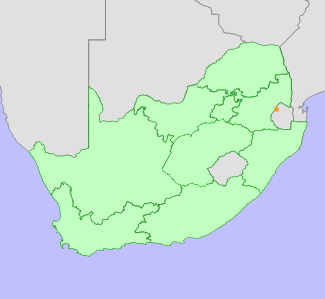|
Scientific Name | Vachellia ebutsiniorum (P.J.H.Hurter) Kyal. & Boatwr. |
Higher Classification | Dicotyledons |
Family | FABACEAE |
Synonyms | Acacia ebutsiniorum P.J.H.Hurter |
Common Names | Ebutsini Thorn (e) |
National Status |
Status and Criteria | Endangered D |
Assessment Date | 2022/02/04 |
Assessor(s) | M. Lötter, J.E. Burrows, L. von Staden & D. Raimondo |
Justification | A very localized species that is known from a single location that is threatened by firewood collection, albeit at low levels. It has an area of occupancy (AOO) of 8 km². The population is small and consists of fewer than 120 individuals. It is therefore listed as Endangered under criterion D. |
Distribution |
Endemism | South African endemic |
Provincial distribution | Mpumalanga |
Range | This species is very localized and is currently known from a single population near Oshoek in the Mpumalanga Province. |
Habitat and Ecology |
Major system | Terrestrial |
Major habitats | KaNgwane Montane Grassland |
Description | Plants occur in exposed, open grassland, on steep, southeast-facing slopes, apparently on serpentine soils, 1100 m. |
Threats |
| The species was discovered with an aid of the Ebutsini tribe, who live close to the area where this tree occurs (Hurter and Van Wyk 2004). They use this particular piece of land for muthi and firewood harvesting. According to M. Lötter (pers. obs.), currently only branches are cut from mature trees, but the trees themselves are not cut down. Should pressure on resources increase in future, they may start to cut down whole trees, thus the population should be monitored for any signs of decline. However, firewood collecting is at present only a potential threat that may lead to sporadic losses of individuals. |
Population |
There is one known subpopulation of approximately 120 mature individuals.
|
Population trend | Stable |
Conservation |
| It is not currently conserved in any formally protected area. |
Notes |
| It is uncertain whether this species occurs in Swaziland as well — the single known population occurs less than 5 km from the border of Swaziland. M. Lötter, who has visited the population, estimates that there is probably not similar suitable habitat in Swaziland, as the altitude increases sharply beyond the border, and the geology is very variable. Hurter and Van Wyk (2004) believe this species might be a serpentine specialist. |
Assessment History |
Taxon assessed |
Status and Criteria |
Citation/Red List version | | Vachellia ebutsiniorum (P.J.H.Hurter) Kyal. & Boatwr. | EN D | 2015.1 | | Acacia ebutsiniorum P.J.H.Hurter | EN D | Raimondo et al. (2009) | |
Bibliography |
Hurter, P.J.H. and van Wyk, A.E. 2004. A new species of Acacia (Mimosoideae) from Mpumalanga, South Africa: Acacia ebutsiniorum. Bothalia 34(1):42-44.
Kyalangalilwa, B., Boatwright, J.S., Daru, B.H., Maurin, O. and van der Bank, M. 2013. Phylogenetic position and revised classification of Acacia s.l. (Fabaceae: Mimosoideae) in Africa, including new combinations in Vachellia and Senegalia. Botanical Journal of the Linnean Society 172(4):500-523.
Raimondo, D., von Staden, L., Foden, W., Victor, J.E., Helme, N.A., Turner, R.C., Kamundi, D.A. and Manyama, P.A. 2009. Red List of South African Plants. Strelitzia 25. South African National Biodiversity Institute, Pretoria.
|
Citation |
| Lötter, M., Burrows, J.E., von Staden, L. & Raimondo, D. 2022. Vachellia ebutsiniorum (P.J.H.Hurter) Kyal. & Boatwr. National Assessment: Red List of South African Plants version 2024.1. Accessed on 2026/02/11 |
 Comment on this assessment
Comment on this assessment

